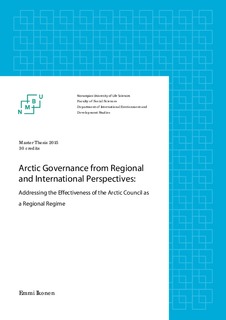| dc.description.abstract | A lot of attention has been paid to Arctic affairs lately, due to the opportunities and challenges which climate change poses in the region. Countries surrounding the Arctic Ocean have obvious interests in the region’s resources, changing environment and social security however these factors have also increasingly drawn the attention of the international community. With increasing bilateral relations especially on trade and research, the regional approach to the Arctic is slowly transforming to accommodate international identities and soft balancing influences of the non-Arctic actors as well. As the definition of ‘an Arctic stakeholder’ is blurring with wider cooperation with the Arctic and non-Arctic countries, this thesis sees that the existing regional institutions are not prepared to address the growing global interests and geopolitical concerns.
This thesis is a qualitative research exercise, approaching the Arctic from the study of regionalism and governance. The problem statement of the thesis aims to address the Arctic region from national and international policy perspectives. The research questions attempt to clarify the main challenges for regional governance in the Arctic as well as look into the structure of the Arctic Council as a regional regime. This thesis argues that the ability of the Arctic Council to influence one way or another will depend on its ability to contemplate action and evolve as the main multilateral decision-making body to accommodate the interests of the non-Arctic states as well.
The thesis draws examples from Canada and China as they approach the Arctic and the Arctic Council framework from very different perspectives, power capacities and opportunities to influence. Canada, being one of the member states of the Arctic Council, is pushing to maintain the status quo dynamics of the Council which this thesis finds to be based on its national interests emphasising strong northern identity and Arctic sovereignty. China on the other hand, an Observer to the Arctic Council, has the capacity and willingness to establish further cooperation with the Arctic states as a benevolent partner. Due to China’s status as a rising political and economic power, the country is often seen as a revisionist actor challenging the status quo of the Arctic Council. This case study is important for this research because the two cases represent the opposite sides of the spectrum on regional and international side of Arctic governance that the problem statement is aiming to address. | nb_NO |

